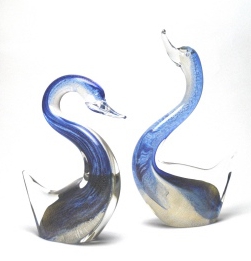Murano Glass Gifts
- All Shops
- Murano Glass Gifts
- Amazing Music Boxes
- Beer Steins
- Limoges Factory
- Gift Guide
- Walking Canes
- Gifts
Glass and its categories
Glass falls into different categories depending on its make, and qualities. It can have many combinations and so it does not have a fixed boiling or melting point. The main ingredient of glass is silica. Commercially, silica (sand), lime stone and soda ash are melted together in a furnace at an extremely high temperature of about 1700o Celsius. It takes many days for the silica to melt and form a jelly like substance which is glass.
This glass is separated and processed according to the requirement. This processing produces different types of glass. These categories of glass vary in their composition and properties. The basic use of glass is to provide transparency. But in the modern contexts glass is used for decoration, solar control, acoustics, security and architecture. Utensil manufacture is another use of glass.
Clear glass
This glass is extremely clear and brilliant in appearance. This is because of the reduced iron content in it. This lets maximum amount of sunlight to pass through it, making it highly transparent. This glass is most suited for solar energy appliances and balcony windows.
Tinted glass
Tinted glass is made by adding various metallic oxides, depending on the desired color. The tinted or colored glass is used mainly for commercial buildings. It is used for ordinary houses to reduce the brightness of sunlight during summer.
Toughened glass
Toughened glass is made by heating glass above 600o and cooling its surface quickly, while the layers underneath remain cooler. So the layers of this thick glass are cooled at different times giving each layers independent properties. When such glass breaks, all the layers do not break together. So it produces almost cuboids and not large sharp and dangerous pieces. So this glass is used in automobile windows, room partitions, building facades etc.
Laminated glass
This glass is made by binding several layers of glass with adhesives. This makes it strong and almost unbreakable. This is used for bullet proofing vehicles and building windows and air plane windows.
Safety glass
A sheet of plastic or celluloid is embedded between two layers of glass. The advantage is that it does not shatter completely. The shattered pieces are held together by the material in between, thus preventing injury from flying glass pieces. Automobile windows are made with this type of glass.
Mirrored glass
To make mirrored glass, one side of the glass is coated with metal layers of silver, chrome or aluminum. To make mirrors, this coating is further protected using other materials. But one-way mirrors have become very popular. This is made by applying a very thin layer of metal to facilitate one-way viewing. This is used in house windows and at other places that need one-way viewing.
Satin glass
Satin glass is otherwise called translucent glass. It admits enough light without being transparent. This glass is made by a process called sandblasting or by acid etching. This glass is used to provide privacy without compromising light.
Patterned glass
Patterned glass is used for decorative purposes. It is produced by passing half melted glass between panels with patterns. This glass is used in designer architecture.
Photo chromatic glass
Photo chromatic glass darkens when exposed to sunlight and becomes lighter in reduced light. It is mainly used in sunglasses. This type of glass is produced by adding silver iodide to molten glass. This causes the glass darken in sunlight.
Pyrex glass
This glass is extremely heat tolerant. This does not break when heated. Lab vessels and bake wares are made using this glass. This is made adding boron oxide to silica. This is otherwise known as borosilicate glass.
Lead crystal glass
This type of glass is used for making decorative art objects. This has high refractive index and so it shines brilliantly. Lead oxide is used as flux in the production of this glass. To increase the brilliance, the surface the art objects is often cut into patterns. So it is also called ‘cut glass’.
Optical glass
This glass is extra transparent and softer than other glasses. Potassium or lead oxides are used to make this glass extra clear. It is used in optical instruments, lenses and prisms.
The glass industry thus produces many diverse types of glass to be used for a number of ordinary and specialized purposes.
by Marina Chernyak


